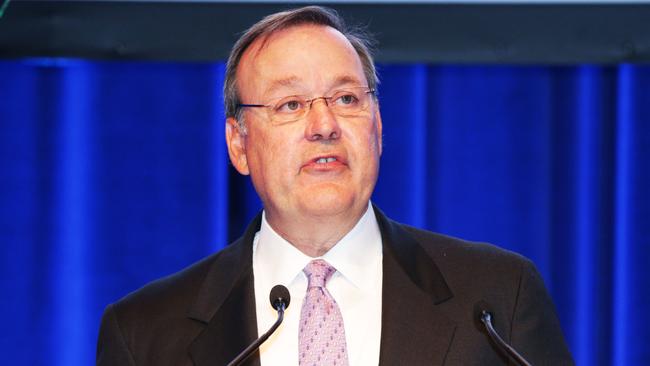Global uncertainty may be good news for QBE
For most, the uncertainty generated by Brexit and Trump would probably be a negative for business. Not so QBE.

In a commentary on what was a very solid QBE performance for 2016, the group’s chairman, Marty Becker, referred to the more uncertain political backdrop that emerged last year amid rising anti-globalisation sentiment, concerns about immigration and the boost in support that they had given to populist politicians.
The vote for Brexit, he said, was feeding through to the UK economy in the form of higher inflation. In the US, while implementation of President Trump’s policies would probably provide a short-term economic stimulus, if enacted they might lead to larger budget deficits, inflationary pressures and increased pressure on the Federal Reserve Board to be more aggressive in raising US rates.
Where, for most, the scenarios outlined by Becker might be seen as threatening, for QBE and its peers they could actually be good news.
“Predicting the impact of political change and geopolitical tension is notoriously challenging; however it is reasonable to conclude that current uncertainty may contribute to more supportive conditions for the insurance industry.
“I say this because, broadly speaking, there are two things that make the operating landscape more favourable for insurers — if insurance prices are increasing or interest rates are rising.
“There are currently grounds for optimism on both fronts. Increased inflation in Europe will inevitably place upwards pressure on insurance pricing, while the pace of interest rate increases in the United States may accelerate as the Trump administration’s impact on the economy becomes clearer,’’ he said.
It has become increasingly evident as central banks have driven policy rates down in the post-crisis period with ultra-low to negative rates and bond and mortgage purchases that they have throttled bank and insurance company profits.
In the first half of last year, close to 80 per cent of sovereign bonds were yielding less than one per cent and half of those bonds were in negative territory.
For insurers, with large policyholder and shareholders reserves that are invested primarily in high-quality government and corporate bonds, that means lower investment earnings.
It also, moreover, has a very big impact on their balance sheet. Insurers are required to use the risk-free rates of the economies they operate in to discount the value of their claims liabilities. The lower the rate used, the larger the liabilities. There is an adverse impact on both profitability and capital strength.
That’s why the prospect of higher interest rates in the markets in which it operates is welcomed by QBE, which has already seen some encouraging signs in the second half of last year.
From midyear US bond yields started to pick up and, while they have fallen back a little from their peaks in December, remain well above the historic lows they reached last year in June. After falling sharply in the first half in what was a flat global, yield curve the second half yield movements produce a steepening of the curve.
For QBE, where the first half settings had a $US283 million negative impact on its claims liabilities, the second half settings pulled that back to an $80 million impact.
With the help of some favourable currency movements, and some tweaking of its investment strategy, the group’s net income from its investment from its policyholder and shareholder funds rose from $US607 million to $US746 million.
Last year QBE, while retaining a conservative investing philosophy, responded to the meagre returns available from sovereign debt by lengthening the duration of its portfolio significantly and liftings its exposures to structured credit and corporate bonds. It also added infrastructure assets.
The second-half shifts in markets and QBE’s modest reorienting of its portfolios resulted in a 50 basis point improvement in the yield on the investments supporting its policyholder funds, from 2.1 per cent to 2.6 per cent, and a percentage point increase in the yield from the investment of its shareholder funds, from 2.3 per cent to 3.3 per cent.
The easing of external pressures on insurers will hopefully continue. The unconventional policies of the major central banks has been undermining the traditional business models of banks, insurers and pension funds, undermining their ability to generate earnings and their capital adequacy and forcing them to accept more market risk than they might traditionally have been prepared to accept.
Thus, where for most businesses, increased risk and volatility is threatening, for the insurers it is welcome.
The improving external environment in the second half coincided with a solid performance by QBE in 2016 at an operational level, with its combined ratio, its claims ratio and its insurance margin improving despite a two per cent decline in gross written premium.
Relatively low levels of catastrophe claims, a significant and accelerating hardening of pricing in its core Australasian markets and continued improvement in what had been the troublesome operations in the US held the group produce earnings growth of five per cent. On a constant currency basis earnings were up 16 per cent.
With a three cents a share increase in the final dividend to 33 cents a share, QBE also announced it would establish a three-year on-market buyback facility of up to $1 billion, with a target of no more than $333 million in any single year.
That’s a measure of confidence that QBE’s position is sound and improving, as well as a recognition that, while it improved from 7.5 per cent to 8.1 per cent, the group’s return on equity remains inadequate.






For most, the global uncertainty generated by Brexit and the Trump administration would probably be regarded as negatives for business, particularly those outside the US. Not so QBE Insurance Group.